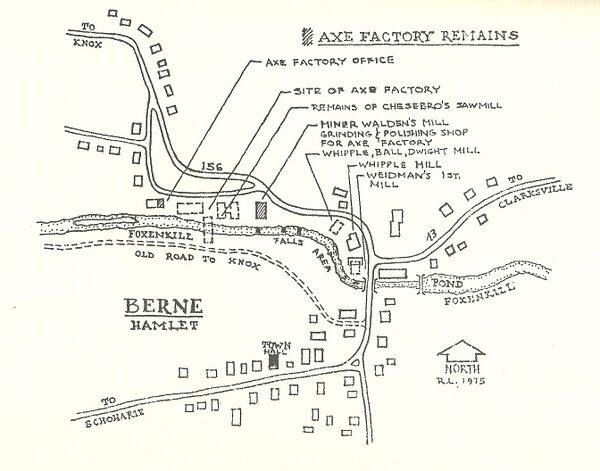Weidmans Gristmill

1975 map by Robert Lambert, from Our Heritage
Jacob Weidman moved his family to Beaver Dam about 1750. Jacob and Elisabetha Weidman built their new home on the banks of Fox Creek above the falls. (See Jacob Weidman's Home Site.) At the top of the falls on Fox Creek in Beaver Dam, Jacob Weidman built a wood dam to create a mill pond. He then built the first saw mill in the Helderbergs. It was just below the falls, and was powered by a waterwheel. Within a few years he or his son Peter had constructed a grist mill below the saw mill.
In the NYS Archives is an 1774 draft lease for the mill land. This would have been one of the earliest Van Rensselaer leases for land in the Helderbergs.
The 1787 map of Berne shows Jacob Weidman owning the southern 165 acres of Lot 598 and his son Peter owning the northern portion of the land. Jacob Weidman’s house is shown on the 1787 map as being on the south side of the Helderberg Trail just east of the mill. That is the site on which Peter later built his own home, as shown by a New York State Historical Marker.
On 3 March 1787 Steven Van Rensselaer deeded out-right 261 acres to Jacob Weidman. This was most unusual, since Van Rensselaer did not ordinarily sell his land. Still, even in this sale, Van Rensselaer kept all rights to the mills, mill dam, and mill stream. Included in Jacob’s purchase was all of the land on both sides of Fox Creek from the saw mill east on both sides of the Helderberg Trail (State Route 443) to its intersection with today’s Tabor Road.
18 December 1790 Peter leased an additional 30 acres of Lot 597, which was called the “Mill Lott.” This is to the west of lot 598 and includes the lower falls and the land on which the gristmill is shown on the 1787 map. Based on this, I conclude that Jacob operated the saw mill and Peter operated the gristmill. The mill lot was later the site of Berne Carding and Fulling Mills and Simmons Axe Factory. The 1866 Beers map shows the mills had been rebuilt; the upper mill was the gristmill, and the lower mill was the saw mill.
Weidman's grist mill burned shortly prior to 1832, the year it was rebuilt by Malachi Whipple. Whipple also built a carding and fulling mill adjacent to the Weidman property in the 1830's. The use of these lands and their water power source was more or less established by the pond above the bridge. [1]
Sources
- ↑ Our Heritage article by Robert Lambert

